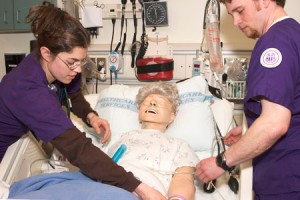BSN—Bachelor of Science in Nursing
 The Bachelor of Science in Nursing (BSN) program at the UW Seattle campus is a two-year professional program that prepares you for a career as a registered nurse. As a BSN student, you will learn from our nationally acclaimed faculty in class and using interactive scenarios in our Learning Lab, allowing you to practice nursing skills in a safe environment before performing them in a supervised clinical setting.
The Bachelor of Science in Nursing (BSN) program at the UW Seattle campus is a two-year professional program that prepares you for a career as a registered nurse. As a BSN student, you will learn from our nationally acclaimed faculty in class and using interactive scenarios in our Learning Lab, allowing you to practice nursing skills in a safe environment before performing them in a supervised clinical setting.
Helpful tools & guides
You will build on those foundational skills with over 1,000 hours of hands-on patient care experience under the guidance of licensed care providers. These experiences take place at one of our 700+ respected community partnership sites, including Seattle Children’s Hospital and the top-ranked University of Washington Medical Center.
With over a ninety-eight percent graduation rate annually, the UW School of Nursing prepares you for success and excellence in nursing.
Curriculum
BSN students begin as college-level juniors, having already completed 90 quarter/60 semester college-level credits or a previous bachelor’s degree in a non-nursing field. A solid foundation of science and humanities prerequisite coursework sets you up for success in our program.
The BSN is a full-time program, including:
- academic coursework focused on critical thinking, care and therapeutics, and health care resources
- in-class lecture with experienced nurse practitioners and researchers
- clinical simulation exercises in our Learning Lab, and
- supervised direct patient care in the field
Many of our BSN graduates continue on to graduate nursing study and careers in research, administration, and education.
UW Tri-Campus A/BSN Program Goals
The BSN program prepares graduates to:
- Integrate concepts from the arts and sciences in promoting health and managing complex nursing care situations.
- Apply leadership concepts, skills, and decision-making in the provision and oversight of nursing practice in a variety of settings.
- Translate principles of patient safety and quality improvement into the delivery of high quality care.
- Appraise, critically summarize, and translate current evidence into nursing practice.
- Integrate knowledge, processes, and skills from nursing science; information and patient care technologies; and communication tools to facilitate clinical decision-making, and the delivery of safe and effective nursing care.
- Describe the effects of health policy, economic, legal, political, and socio-cultural factors on the delivery of and advocacy for equitable health care.
- Demonstrate effective professional communication and collaboration to optimize health outcomes.
- Deliver and advocate for health promotion and disease prevention strategies at the individual, family, community, and population levels.
- Demonstrate value-based professional behaviors that integrate altruism, autonomy, integrity, social justice, and respect for diversity and human dignity.
- Demonstrate critical thinking, clinical decision-making, and psychomotor skills necessary for the delivery of competent, evidence-based, holistic, and compassionate care to patients across the lifespan.
- Demonstrate critical interrogation of positionality, recognition of implicit biases, as well as knowledge and application of anti-racism principles to promote health equity.
Accreditation
The baccalaureate degree program in nursing at the University of Washington is accredited by the Commission on Collegiate Nursing Education (http://www.ccneaccreditation.org).